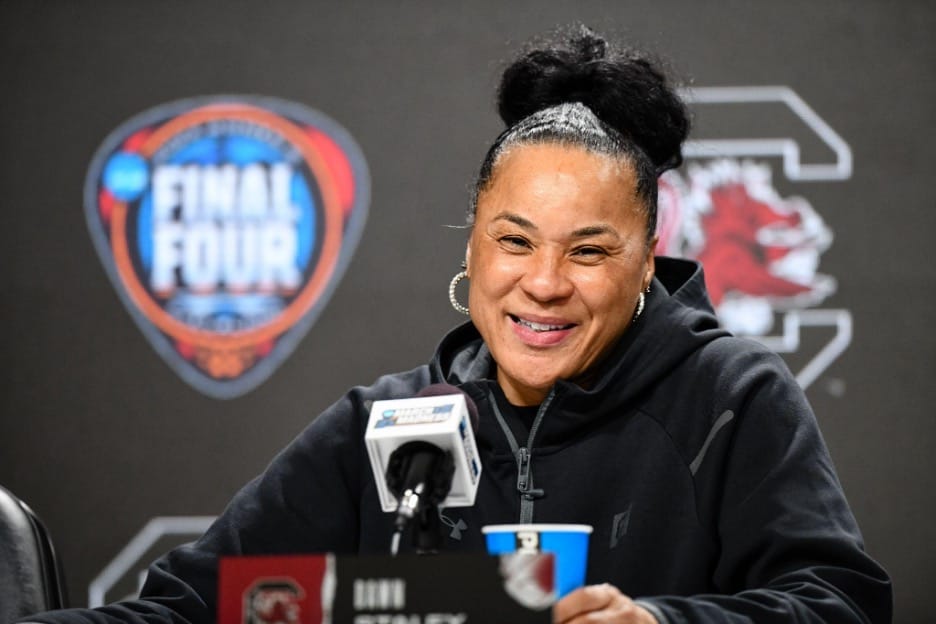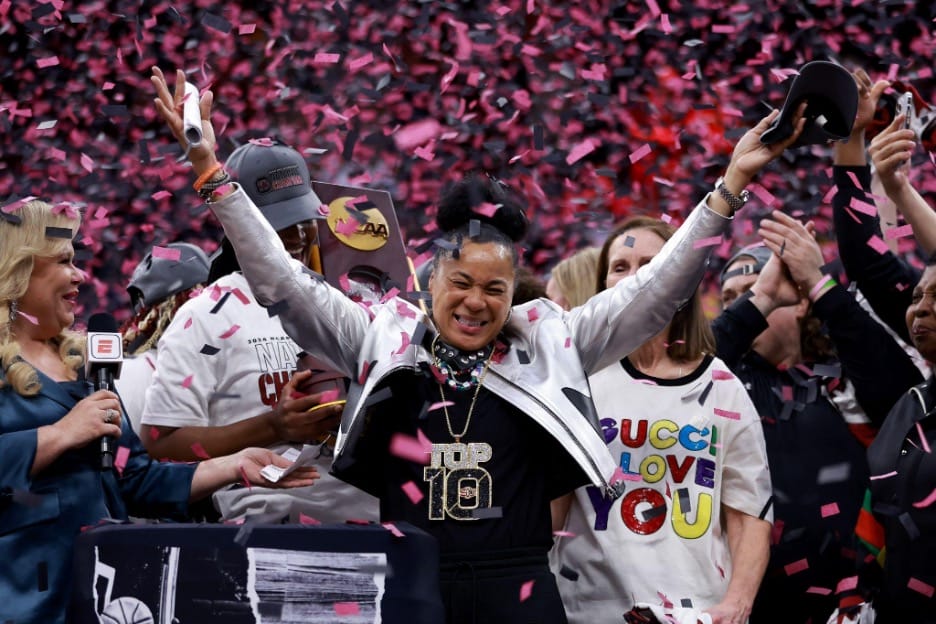A thrilling season of NCAA women’s basketball concluded last weekend with record high viewership and the influential voice of Coach Dawn Staley speaking up for transgender women in sports.
These shining moments speak volumes about the peak play by star athletes across the league and the devotion of fans drawn to it. They also reveal the hollowness of those baselessly claiming transgender women are any threat to women’s sports. On Monday, the National Association of Intercollegiate Athletics (NAIA) mandated that athletes participate in women’s sports only if they are assigned female at birth. CBS Sports reported that the president of the NAIA said, “The NAIA has no knowledge of transgender athletes competing in its postseasons to this point.”
NAIA claims it formed its policy with a “task force” and review of “research.” Membership of the task force, “experts” consulted and research citations were not provided. Trans athlete and advocate Chris Mosier reported “no one I know who works in trans inclusion in sport has heard of this” task force.
“Media reporting on the NAIA decision should ask for evidence to back up this baseless ban,” said GLAAD President and CEO, Sarah Kate Ellis.
“How many transgender athletes compete in this conference? Which transgender people and experts in athletics, medicine, and human rights were consulted? The evidence points to a purely political decision by the NAIA that harms all athletes. The overwhelming success of the NCAA women’s basketball season shows that the NCAA itself and its championships have gotten along just fine with its current policies that include trans people. Policymakers need to stop targeting trans women for the phony sake of “protecting” women or women’s sports,” Ellis said.
“Transgender athletes are few in number but have long been included in the NCAA’s inclusive policies to zero negative effect on any other player or the game itself,” Ellis continued.
View this post on Instagram
“In fact, the women’s game has never been stronger or more popular, with incredible play and record-breaking viewership throughout a thrilling season and tournament.”
Staley and the South Carolina Gamecocks won their third national championship on Sunday, capturing an undefeated season. ESPN reported an astonishing 24 million fans watched at the peak of the title game coverage. This bested Saturday night’s semi-final record high viewership of 14.2 million, which was reported as the most-watched basketball game ever on ESPN, including men’s games, women’s, college and professional.
South Carolina became the first team in 25 seasons to reach the Final Four, let alone go undefeated, without returning any starters from the previous year. Poynter also noted Staley’s wildly successful record as player and coach, including at the University of Virginia, then in the WNBA. Staley is a two-time Naismith college player of the year, a six-time WNBA all-star and a three-time Olympic gold medal winner. She was the American flag bearer at the opening ceremony of the 2004 Summer Olympics. Staley is a four-time Naismith coach of the year, including being honored as coach of the year this season.
Staley’s expertise as a coach and player and reputation as a coach who nurtures people as well as players, bolster her credibility and the impact of her words at a news conference Saturday night in Cleveland.
Dawn Staley says trans women should be allowed to play women’s sports. Says she knows she’s going to get heat now before the biggest game, and she’s okay with that.
(I believe it was Outkick that asked the question.)
What an incredible statement of inclusivity from Dawn. Wow.
— Lindsay Gibbs (@linzsports) April 6, 2024
Staley responded to questions about transgender women in sports.
Staley paused, took a sip of water, and stated clearly, “I’m of the opinion … if you’re a woman, you should play. If you consider yourself a woman and you want to play sports or vice versa, you should be able to play. That’s my opinion.”
Staley then followed up with the reporter. “You want me to go deeper.” The reporter started: “Do you think transgender women should be able to participate …” Staley responded, “That’s the question you want to ask, I’ll give you that. Yes, yes. So now the barnstormer people are going to flood my timeline and be a distraction to me on one of the biggest days of our game, and I’m OK with that. I really am.”
The facts back Coach Staley. Trans women are women. The NCAA has welcomed transgender participation in sports since at least 2010. The International Olympic Committee released guidelines more than two years ago to support transgender participation, written in consult with medical, athletic and human rights professionals, stating there should be “NO PRESUMED ADVANTAGE BASED ON SEX ASSIGNED AT BIRTH OR SEX CHARACTERISTICS.”
Basketball fans responded to Staley’s comments with a mix of awe, joy and respect.
Meredith, a nonbinary University of South Carolina student, wrote to reporter Lindsay Gibbs, who covered Staley’s news conference.
“I heard about what Dawn said earlier today and it filled me with joy. It was a relief to hear this from her for several reasons, one being that she made comments last week about how God brought her to this moment,” Meredith said. “Knowing that she accepts anyone for their identity while simultaneously holding her beliefs makes me even more of a fan. Dawn is proof that someone can love God while also loving others for who they are.”
Journalist Ina Fried wrote to Gibbs about the bigger picture.
“As a 20+ year huge fan and supporter of women’s sports and especially women’s basketball, it is so powerful to hear her message of inclusion,” Fried said.
“There are so many challenges facing women’s sports compared to men’s — lesser facilities, smaller media deals, lower budgets, etc. and yet all we ever hear about from the ‘save women’s sports’ crowd is about banning trans athletes. We can impact women’s sports so much more by giving them the attention and respect they deserve than by worrying that someday maybe a trans woman might win something.”
“Coach Staley and her championship team electrified the sports world and elevated excellence on and off the court,” said GLAAD President and CEO Sarah Kate Ellis.

“Coach Staley simply spoke the truth that trans women are women and should play if they want. All of us can take a page from Coach Staley’s playbook as a sports leader and person of high integrity guided by faith, compassion and common sense. True champions empower and inspire others to their absolute best. Everyone wins when all are welcome.”
Despite the overwhelming success of the women’s basketball tournament, which reached new heights for excellent play and popularity, the NAIA announced a ban on transgender athletes the very next day. Athlete and advocate Chris Mosier, the first out transgender athlete to represent the United States in international competition, noted many flaws in the NAIA’s decision:
- NAIA President Jim Carr admits there has never been a trans woman in postseason competition in the history of the organization.
- Mosier says he knows of two only trans athletes who have been in NAIA sports, and both were trans masculine athletes.
- NAIA claims it has had a “task force” working with “experts” for nearly two years, but Mosier says “no one I know who works in trans inclusion in sport has heard of this.”
- Mosier concluded: “this decision is clearly due to political pressure and not any real issue with transgender women in NAIA sports.”
The Washington Post reported: “The NAIA does not track whether any out trans athletes are among the approximately 83,000 participating in its sports,’ a spokesperson said. The organization’s 2023-24 policy allows trans and nonbinary athletes to compete in any gender category during the regular season.”
“[The] NAIA and NCAA, along with many other sport organizations, teams, and leagues, have been under attack by anti-trans groups and individuals who have made it their life’s work to harm transgender people,” Mosier wrote in an email to the Washington Post. “A policy change at this time, without a robust process of engaging experts, athletes, and people with lived experience, is solely based on political pressure.”
There is no evidence that transgender women are dominating women’s sports or posing a threat to sports or other athletes. Swimmer Lia Thomas, the best-known and most defamed transgender collegiate athlete in history, followed all protocol to participate, in a year that also saw cisgender swimmers break world records and finish ahead of Thomas in races she participated in. Olympian Erica Sullivan came in 2nd after Lia Thomas at the NCAA Championships 500-meter free and wrote that she’s proud to support Lia and all trans athletes.
Hundreds of other swimmers stated support for transgender athletes and endorsed the expertise of medical, athletic, and human rights professionals who helped shape the IOC’s inclusive policy.
GLAAD guidance to reporters for covering transgender people and issues includes the number one recommendation: stories about transgender people should include transgender voices. Policies regulating or restricting transgender people should bring trans voices into those conversations and decisions, to ensure the impact, lived experience, and reality of trans people is accurately reflected and represented.
Ashland Johnson, the founder of The Inclusion Playbook, said in a statement provided to Power Plays: “Now, with one of the most celebrated and respected women in athletics, who actually has skin in the game, speaking out to support trans women participating in athletics, the question remains: Will policymakers put politics aside and listen to the very women they claim they are trying to protect?”













